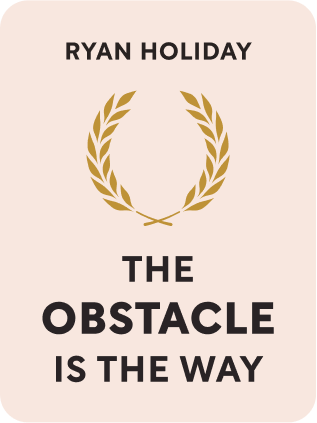

This article is an excerpt from the Shortform book guide to "The Obstacle Is The Way" by Ryan Holiday. Shortform has the world's best summaries and analyses of books you should be reading.
Like this article? Sign up for a free trial here .
What is the Stoic take on suffering? How does subjective perception cause suffering?
According to Stoics, suffering is, to a great extent, the result of our inability to see things as they are. In contrast, Stoics view events neutrally—that is, they observe only the facts of any given situation, without judgment.
Here is how our inability to see things as they are leads to unnecessary suffering.
Suffering Is Our Own Doing
In our everyday lives, we assign meaning to everything that happens to us, judging events to be either good or bad. According to Ryan Holiday, the positive or negative judgments we make about the events in our lives are nothing more than illusions—they’re often detached from reality. We invent narratives of cause and effect that aren’t true, convincing ourselves that external occurrences have far greater power over us than they really do.
Holiday argues that in reality, these subjective judgments themselves are what cause much of our suffering. Stoics, however, strive to see things as they are. As the Stoic philosopher Seneca put it, we suffer more often in imagination than in reality. By simply learning to see these events objectively, as neither good nor bad, we spare ourselves a great deal of pain.
For example, imagine you hear a rumor that the company you work for is operating at a loss and several employees need to be fired. You fear you’re going to lose your job and begin to panic. Holiday would argue that the risk of getting fired isn’t the problem—your warped, negative view of the situation, causing fear and panic, is the problem. This rumor isn’t necessarily an unfortunate turn of events: You don’t know that it’s true, or that you would be one of the employees fired.
Even if you are fired, there’s a chance you might immediately find a better job, and getting fired will have been one of the best things to ever happen to you. By fearing the worst, you’re suffering unnecessary emotional stress that makes it more difficult to work toward a solution.
Seeing events objectively, as Stoics see them, doesn’t come naturally—Holiday frames it as a skill you need to intentionally hone. Whenever you catch yourself lamenting over your own misfortune, stop and remind yourself that there’s no such thing as misfortune.
| Cognitive Behavioral Therapy Is About Cultivating Objectivity Holiday’s claim that subjective perceptions cause most of our suffering has significant support from the field of psychology. In the popular branch of psychotherapy known as cognitive behavioral therapy, or “CBT,” a patient and therapist work together to identify the patient’s harmful and inaccurate perceptions of reality; replace them with healthier, more realistic beliefs; and build habits of responding to negative emotions in constructive ways. In Feeling Great, psychiatrist David Burns explains that people who suffer from anxiety and depression experience the types of distorted, irrational negative thoughts that Holiday mentions. For example, they overgeneralize, telling themselves that because they did one thing wrong, they are “bad people” doomed to make things worse for the rest of their lives. Or, they “discount the positive,” devaluing their successes and claiming that they don’t really count. Burns agrees with Holiday that seeing things objectively is a trainable skill, and for this reason, he offers readers many exercises to help them perceive events without judgment.The success of cognitive behavioral therapy in clinical settings supports Holiday’s argument about the power of perspective. A meta-analysis of over a hundred independent studies found that cognitive behavioral therapy is indeed effective, especially in treating anxiety disorders, stress disorders, bulimia, and problems with anger control. |
Even Death Isn’t Necessarily Bad
Stoics believe that no situation is objectively good or bad, without exception. This includes the condition that many see as the universal curse of humanity: our own mortality. Holiday argues that the reality that we’re going to die someday—perhaps even today—is a neutral fact, like anything else, that we can choose to interpret however we wish.
Holiday points out that the fact we’re going to die actually offers us a number of benefits, as long as we see the situation objectively enough to notice and claim them. An awareness that our days are numbered actually makes many things easier for us—we’re more readily grateful for the good things we have in life, and we’re motivated to pursue what we truly think is important instead of wasting time living an unfulfilled life. These are gifts we wouldn’t have if not for our own mortality—which, according to Holiday, proves that death itself is not necessarily a bad thing. Like everything else in our lives, it’s a neutral fact of life.
| We Didn’t Always Fear Death In Antifragile, Nassim Nicholas Taleb argues that humans in modern society fear death far more than they did back in classical antiquity. He asserts that before the Enlightenment, the average person’s goal wasn’t to avoid death but to die in a noble way that accomplished something for future generations—for example, to die in battle defending your nation, or to leave behind a business that will help your children live a better life. This supports Holiday’s argument that, given the right perspective, even a situation as grim as your own death can be something worth celebrating. Taleb advocates for a return to this collective-minded attitude toward death. In his eyes, our focus on our own lives as an end goal causes our society to be more fragile. For example, by accruing governmental debt and depleting natural resources, we’re enriching ourselves at the expense of future generations, damaging the human race as a whole. Instead of trying to live longer, we should be trying to live purposefully, die, and make room for others. |

———End of Preview———
Like what you just read? Read the rest of the world's best book summary and analysis of Ryan Holiday's "The Obstacle Is The Way" at Shortform .
Here's what you'll find in our full The Obstacle Is The Way summary :
- Why you should think of any obstacles as opportunities
- How Stoicism can show you the way to overcome challenges
- How Theodore Roosevelt's struggle with asthma prepared him for future struggles






